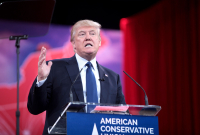Support strong Canadian climate journalism for 2025
A day after controversial U.S. president-elect Donald Trump took to social media to denounce a massive Pacific Rim trade deal, Canada's own trade minister decried the rise of "ugly" partisan politics and anti-globalization forces.
Chrystia Freeland offered up that analysis in testimony Tuesday before the Senate trade committee, saying that the anti-trade movement poses a threat to the world not seen since the Great Depression.
On Monday, Trump renewed his vow to pull the United States out of the controversial, 12-country Trans-Pacific Partnership, which includes Canada.
Earlier Tuesday, Freeland said the TPP would not be able go ahead without the U.S.
Later, during her committee appearance, Freeland delivered an unsolicited broadside against the growing global anti-trade sentiment.
She said the world is witnessing forces not seen since "maybe any time since the 1930s."
"We're living in an era of nativism and protectionism, something that I think is very dangerous for the world and for Canadians," she said.
The committee was hearing evidence on Canada's participation in a new World Trade Organization initiative called the Trade Facilitation Agreement.
But Freeland's remarks appeared aimed at Trump's protectionist rhetoric, the protectionist forces in Europe that nearly scuttled Canada's free trade deal with the continent and Britain's vote to leave the European Union.
"At a time when so many other countries are being torn apart by ugly and polarized politics, I'm really pleased to be able to be here with you and to strongly support the TFA, which was struck by the previous government," Freeland said.
Asked after the meeting to clarify whether she was referring to the U.S., Freeland told The Canadian Press: "I leave it up to senators and listening Canadians to chose which countries they feel are riven by such divisions."
During her testimony, Freeland extolled the co-operation by Conservatives and Liberals on the TFA.
"In working together on this across party lines, we really are able to show that some issues are simply in the national interest and not a reason for partisan fighting."
On the TPP, however, a partisan fight indeed broke out in the Commons earlier Tuesday on how Canada should deal with Trump's pledge to pull the U.S. out of the pact.
During question period, Conservative trade critic Gerry Ritz urged Canada to follow some of its other TPP partners — notably Japan, New Zealand, Mexico and Australia — and ratify the deal without the U.S.
"They're going to go it alone without the U.S. Why aren't we a part of that?" Ritz demanded.
Replied Freeland: "Even if all other 11 ratified, there is no TPP."
Interim Conservative leader Rona Ambrose said it's "all hands on deck" when it comes to fighting anti-trade sentiments around the world, and Job 1 should be rescuing the Pacific Rim deal.
"I think that this government had no idea that this was going to happen so they had no Plan B in place," Ambrose said outside the House.
"They need to get their ducks in a row very quickly because Canada is reliant on trade."
It's long been no secret that the Pacific Rim deal would hinge on the participation of the U.S., a factor that boils down to simple arithmetic, Freeland said. She said it can only come into force if ratified by six of the 12 member countries representing 85 per cent of their combined GDP.
"What that means, in practice, is the TPP agreement as currently structured and finalized can only come into force if it's ratified by the United States."
In a YouTube video released Monday, Trump said he will issue a notification of intent to withdraw from the agreement on his first day in power, a move many believe would kill the deal outright.
A Canadian government official, speaking on condition of anonymity because of the sensitive nature of the issue, said no decision on pulling out of the TPP becomes final until February 2018.
When the participating countries signed the agreement last February in New Zealand, that two-year time frame was built into the process to take into account the domestic political situations in all 12 countries, the official said.
The TPP is intended to open up trade among the 12 countries that encompass nearly 40 per cent of the world's GDP, including Canada.
The YouTube video of Trump, who has repeatedly criticized the TPP as "a potential disaster" for America, did not mention NAFTA, which he has also promised to either renegotiate or withdraw from altogether.
Freeland said the U.S. and Canada both benefit from NAFTA.
"Canada is the chief export market of 35 U.S. states, and nine million U.S. jobs depend directly on U.S. exports to Canada."





Comments